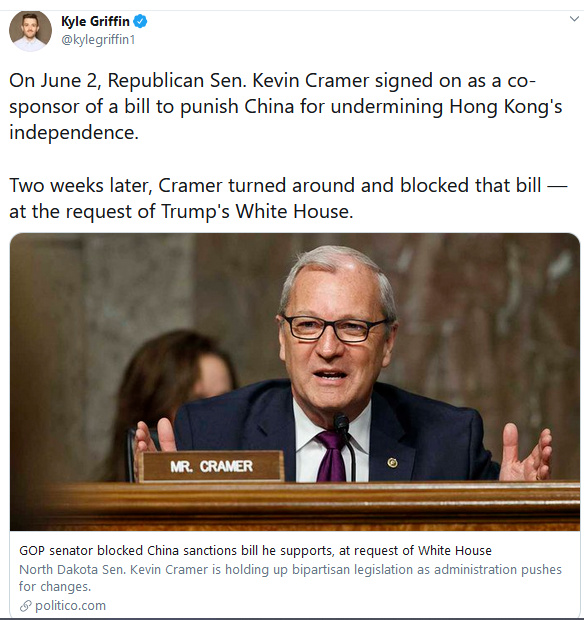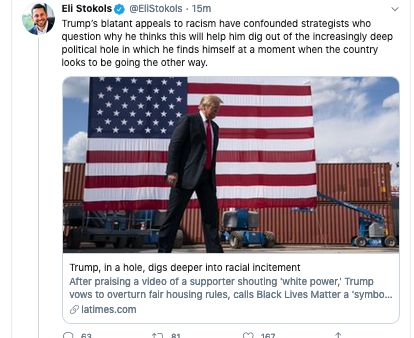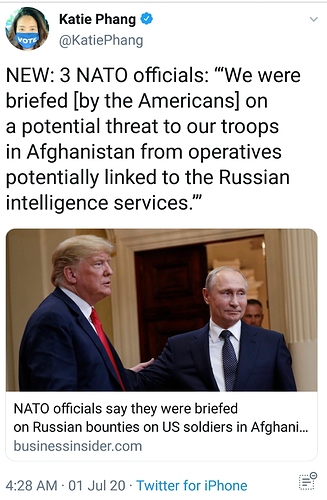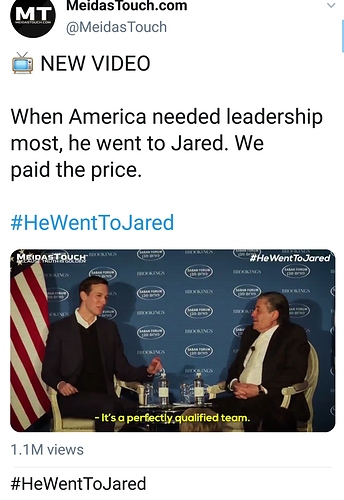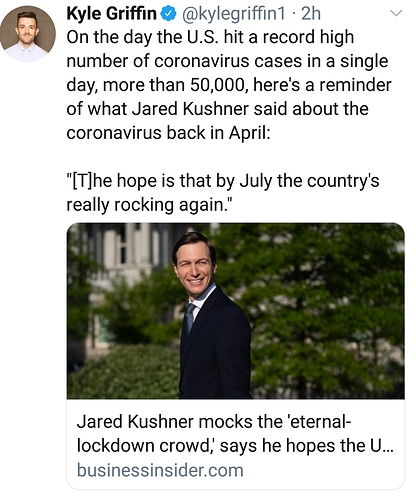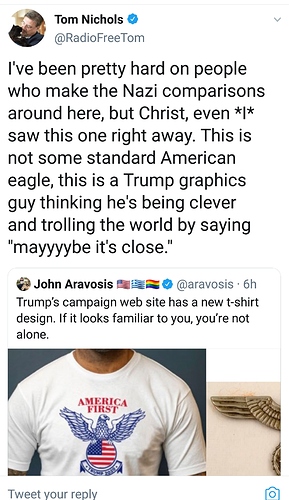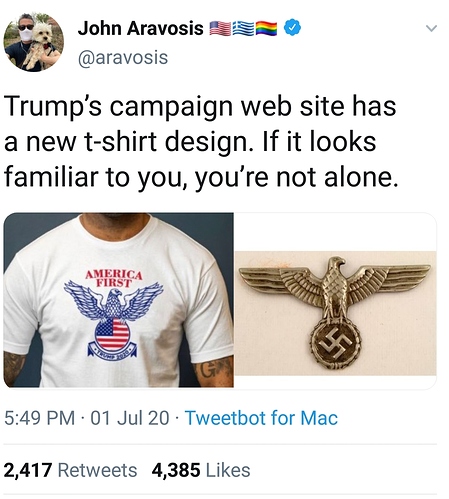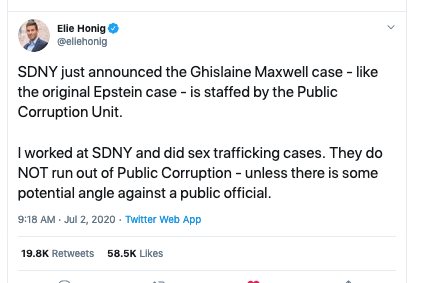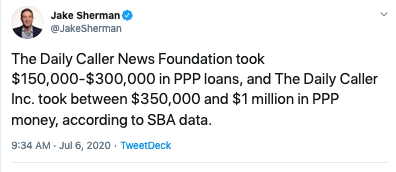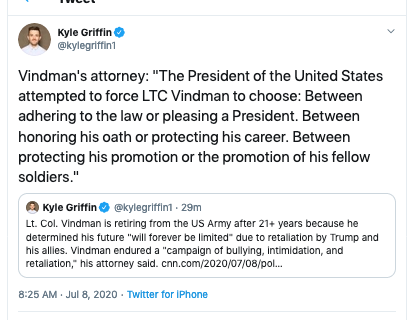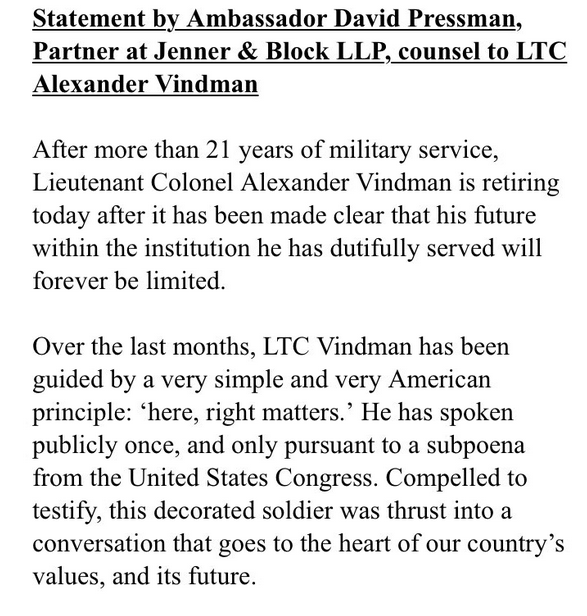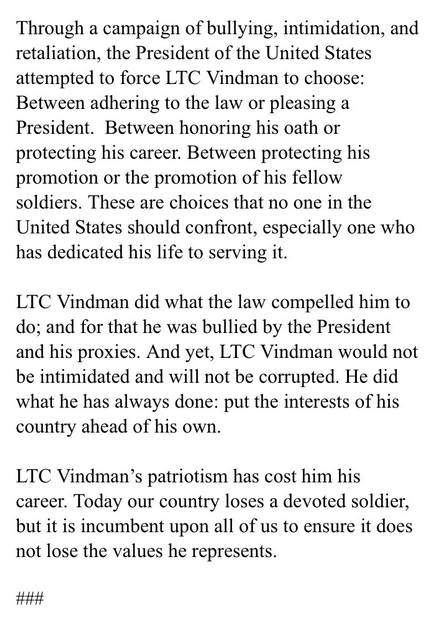Talk about utter cowardice.
Former spies say Trump’s claim that no one told him Russia may have been paying militants to kill US troops is ‘horsesh–’
- The Trump administration is under pressure amid reports that the White House failed to take action after being briefed on intelligence showing that Russia paid Taliban-linked militants secret bounties to kill American troops.
- The White House pushed back on the reports, saying the president was never briefed on the intelligence because there was dissent within the intelligence community about its credibility.
- The White House’s claim that this information was not conveyed to Trump because there wasn’t a consensus on its credibility is “horses–t,” Steve Hall, the CIA’s former chief of Russia operations, told Insider.
- If the White House claim is true, it would be a catastrophic failure on the part of the intelligence community and would amount to “dereliction of duty,” a former CIA analyst told Insider.
- The other possibility, Hall said, is “whether the topic of Russia has become so radioactive in this administration, dating back to the 2016 election, that it can’t even be raised with Trump because he just goes bonkers or shuts down.”
- Visit Business Insider’s homepage for more stories.
The Trump administration is under fire following an explosive New York Times report that said President Donald Trump took no action after being briefed on US intelligence showing Russia offered and secretly paid Taliban-linked militants secret bounties to kill US troops.
The White House denies Trump knew anything about it, saying he was not briefed on the intelligence because officials disagreed on its veracity.
Steve Hall, the former chief of Russia operations at the CIA, told Insider the White House’s claim is “horses—t” because threat intelligence is treated very differently than other types of sensitive intelligence.
“Ever since 9/11, any time you get any type of counterterrorism or threat reporting that speaks to whether Americans are going to get killed, that sort of information travels extremely quickly and doesn’t have to be vetted,” Hall said. “And that’s all right, because the outcome could be horrific. You could have Americans killed.”
If the underlying intelligence is questionable or if there’s a debate on its credibility, “you convey that as well, but the one thing you don’t do — and you’re taught this as an intelligence officer from the very beginning — is just write it off,” Hall said. “It would be intelligence malpractice for anybody in the IC to look at something like this that could result in Americans dying and say, ‘We haven’t validated the source, so we can’t talk about it or brief the president about it.’ That’s just ludicrous.”
Hall was one of three CIA veterans who spoke to Insider, all of whom said they were shocked that the president was either not briefed on intelligence about a threat to deployed US troops or failed to act after learning of it.
‘The type of information that would be flagged as really important’
The Times, citing anonymous officials, reported that Trump was briefed on the matter and the National Security Council discussed the information during an interagency meeting in late March.
The AP reported Tuesday that senior White House officials were aware of the Russian bounties as early as March 2019.
According to the AP, then-national security adviser John Bolton briefed the president on the matter, and multiple media outlets reported that the intelligence was included in at least one President’s Daily Brief (PDB), a daily presentation of important intelligence on threats and opportunities.
But Trump contradicted the reports, saying over the weekend that intelligence officials told him after The Times article was published that they did not brief him on the information because they did not deem it to be credible enough to be brought to his attention.
White House Press Secretary Kayleigh McEnany also said Monday that there are “dissenting opinions” within the intelligence community, meaning that the intelligence “would not be elevated” to the president “until it was verified.”
However, “the fact there is dissent within the intelligence community about the veracity of reporting means that the subject matter was important enough to be raised to the level of discussion between different agencies,” Rodney Faraon, a former CIA analyst who provided intelligence briefings to President Bill Clinton, told Insider.
“This is intelligence that deals with the safety and security of American troops,” Faraon said. “This is the type of information that would be flagged as really important, particularly if it came through intelligence channels.”
Katrina Mulligan, who worked on the NSC during the Obama administration, noted on Twitter that there is “often no consensus on intel,” and that “as any NSC staffer can tell you, Presidents and their teams are often forced to make decisions in the absence of perfect information. That’s the job!”
David Priess, a former CIA officer who briefed Clinton and George W. Bush on intelligence, expressed skepticism about Trump’s claims that he and other top officials were not briefed, writing on Twitter that if the intelligence was not considered serious enough to merit Trump’s attention, then “shame on the system.”
Insider also reported that NATO officials were aware of and briefed on the intelligence, raising further questions about why US officials would deem the information important enough to brief allies but not the president, as he’s claimed.
US Central Command told Insider on Monday that there have been no changes to the US force posture or security status in the Middle East in response to the intelligence, nor has there been an uptick in Taliban-linked attacks on US forces in the past six months.
The Pentagon said Monday night that it “has no corroborating evidence to validate the recent allegations found in open-source reports,” but stressed that it will “always take the safety and security of our forces in Afghanistan — and around the world — most seriously and therefore continuously adopt measures to prevent harm from potential threats.”
‘Any normal president would be briefed’
While these developments raise questions about the credibility of the intelligence, former analysts said the president still would have been informed in any normal scenario.
John Sipher, the former deputy chief of Russia operations at the CIA, told Insider that the intelligence would have been widely known to those around Trump and that “it is hard to believe that he wouldn’t be briefed.”
“Not presenting information to the president of the United States that had direct indications of a threat to US military forces overseas, not bringing that forward, would be a dereliction of duty,” Faraon told Insider.
“Anything like this that has to do with a foreign power, particularly one with whom we are technically not at war with, threatening the lives of American soldiers overseas, that is at the top of the list,” he said.
That said, national security veterans pointed to Bolton’s book and multiple media reports saying the president often does not pay attention during briefings, does not read the PDB, and frequently loses interest in the discussion unless he sees or hears his own name.
“Any normal president would be briefed,” Sipher said. “Any normal president would want to know the latest intelligence,” but “Trump has never shown any interest in governing.”
In Trump’s case, he added, “it is possible that very little of consequence is passed to the president until they believe he is ready to hear it, and they have had time to prepare him. Of course, in many ways this is worse than having been briefed on the information and done nothing.”
Hall largely agreed.
“If you run through all the possible explanations for this, there is no reasonable scenario in which this isn’t horrific,” he said.
If Trump was briefed and he’s misleading the public or doesn’t remember being briefed, Hall said, “then that’s pretty horrific too, because it means the president has difficulty paying attention to threats against American soldiers.”
If Trump was not briefed, as he’s claimed, “then you have an incredibly bad system in place if that kind of critical information isn’t making it to the president,” Hall said.
“And then finally, coming down to the narrowest point of all this is whether the topic of Russia has become so radioactive in this administration, dating back to the 2016 election, that it can’t even be raised with Trump because he just goes bonkers or shuts down,” he said.
The Trump regime is portraying the small but increasingly potent Chinese nuclear arsenal as the big new threat that President Trump and President Vladimir Putin of Russia should confront together.
A New Superpower Competition Between Beijing and Washington: China’s Nuclear Buildup
The Trump administration is portraying the small but increasingly potent Chinese arsenal — still only one-fifth the size of the United States’ or Russia’s — as the big new threat.
T’s tactics to double down on his racist commentary says it all - he’s descending further into his own rhetoric which he deeply believes, and it’s open season on the issue.
Deplorable #1 and Igniter-in-Chief of racist America
July 1, 2020
1:07 PM
WASHINGTON —
President Trump on Wednesday suggested that painting the words “Black Lives Matter” on New York City’s Fifth Avenue would amount to a “symbol of hate,” complaining that such an action would be “expensive” and “denigrating this luxury Avenue.”
That came shortly after a threat by the president to veto the Pentagon’s budget legislation should it include a measure to take the names of Confederate generals off military bases, which he denounced as being sponsored by “Elizabeth ‘Pocahontas’ Warren (of all people!)”
That came only hours after his declaration that he “may END” a federal housing regulation aimed at desegregating neighborhoods, which he claimed has had “a devastating impact” on America’s suburbs.
And that came roughly a day after he re-tweeted a video of supporters in an almost entirely white Florida retirement community shouting “white power” from a golf cart.
Sinking further behind former Vice President Joe Biden in the presidential race, Trump in recent days has indulged in a string of blatant appeals to racism.
Coming at a moment when Black Lives Matter protests appear to be shifting Americans’ views on race, his move has confounded many political strategists in both parties, who question why Trump believes such appeals will help him dig out of the increasingly deep hole in which he finds himself.
“What voters are looking for is a way to get balance and peace back in the nation and in the White House,” said Peter Hart, the veteran Democratic pollster. “Everything he does is confrontation.”
In a political moment shaped by the death of George Floyd, Trump has positioned himself as the political heir of George Wallace, said Douglas Brinkley, a presidential historian at Rice University in Houston, who noted that Wallace, the former governor of Alabama, and Sen. Strom Thurmond of South Carolina both failed in their attempts to win the presidency on openly white supremacist platforms.
“History will look at the Trump years as being a reactionary right-wing movement that saw America was becoming 60% nonwhite and panicked,” Brinkley said. “When the economy crashed and George Floyd was murdered, Trump had cement feet. He went back to a tired old playbook, and he lost the center in America. If you were a conservative, center-right voter, you’re now looking to get rid of him.”
A raft of recent nonpartisan polls backs up that assessment. With only four months left until election day and the country convulsed by protest while still in the throes of a worsening pandemic, Trump trails Biden, the presumptive Democratic nominee, by double digits nationally and in a growing number of swing states. His support has eroded among some of those who backed him four years ago.
While Trump appears to believe that appeals to racial resentments will cement his support among his core voters, the issue clearly hurts him in the wider electorate.
Only 35% of voters said they had confidence in the president’s ability to “effectively handle race relations” and only 15% said they were “very confident,” according to a Pew Research survey released Tuesday. A majority of those polled, 55%, also said Trump had “changed the tone of political debate in the U.S. for the worse” as opposed to just 25% who said he had changed it for the better and 19% who said not much change either way.
Hard-edged exploitation of race has been a recurring theme in Trump’s career, but the current rampage represents a shift of sorts. At times over the last year, he has tried to appeal for support of Black voters, touting his backing of reforms in federal sentencing laws, among other issues.
Trump initially declared himself “an ally of all peaceful protesters” during a Rose Garden address on June 1, just as unmarked federal troops were tear-gassing protesters outside the White House gates in order to clear Lafayette Square for his photo op with a Bible outside a church. He has met with Black families whose loved ones have been killed by police officers, but has also offered more full-throated support to law enforcement while seeking to define protesters generally as lawless thugs.
His Wednesday morning tweets encapsulated the overall approach.
“NYC is cutting Police $’s by ONE BILLION DOLLARS, and yet the @NYCMayor is going to paint a big, expensive, yellow Black Lives Matter sign on Fifth Avenue, denigrating this luxury Avenue. This will further antagonize New York’s Finest, who LOVE New York & vividly remember the…” Trump said in the first of two tweets.
He continued in the second: "…horrible BLM chant, ‘Pigs In A Blanket, Fry ‘Em Like Bacon’. Maybe our GREAT Police, who have been neutralized and scorned by a mayor who hates & disrespects them, won’t let this symbol of hate be affixed to New York’s greatest street. Spend this money fighting crime instead!”
“He’s deflecting, diverting, distracting from his own failure to lead” on race and the coronavirus, said Donna Brazile, the former chairwoman of the Democratic National Committee.
“I think it’s a miscalculation right now because the people protesting are not just Black people.”
The Black Lives Matter movement, which 74% of Americans now say they support, has “become not just an urban, but a suburban rallying point. It’s being led by young people, who are asking their parents, ‘How can you support this man in the White House?’” Brazile added.
New York City Mayor Bill de Blasio fired back at Trump, defending painting the words “Black Lives Matter” in the street.
“It’s an important message to the whole nation, and obviously we want the president to hear it because he’s never shown respect for those three words,” the mayor said during an appearance on MSNBC’s “Morning Joe.”
In some cases, Trump’s rhetoric, beyond affecting him politically, is also influencing government policy.
Following an executive order last week, the Department of Homeland Security on Wednesday announced the establishment of the “Protecting American Communities Task Force,” which will coordinate law enforcement assets “in an effort to protect monuments, memorials and statues.”
“We won’t stand idly by while violent anarchists and rioters seek not only to vandalize and destroy the symbols of our nation, but to disrupt law and order and sow chaos in our communities,” Chad Wolf, the department’s acting secretary, said in a statement.
Trump has repeatedly defended monuments to Confederate generals as part of “our heritage” and used his Twitter feed to threaten protestors who have defaced or destroyed them.
Despite his broadsides, an increasing number of cities and states have begun removing Confederate monuments from prominent positions. On Wednesday, for example, officials in Richmond, Va., began taking down a large statue of Stonewall Jackson.
Trump’s threat to veto the $740-billion Defense Authorization Act should it include a measure to rename military installations drew a strong reaction from Democrats on Capitol Hill, who noted that a veto would block a pay raise for service members.
“This is just a pattern of him pandering to the white supremacists in America and the folks who believe that the Confederacy was something to be honored,” said House Majority Leader Steny Hoyer (D-Md.).
Senate Minority Leader Charles E. Schumer (D-N.Y.) appeared to call the president’s bluff, predicting that the measure would pass with the renaming requirement, already part of the Senate version of the bill and likely to be added to the House legislation.
“President Trump will not veto a bill that contains pay raises for our troops and crucial support for our military,” Schumer said, calling the president’s tweet “nothing but the typical bluster.”
But Sen. James Inhofe, (R-Okla.), chair of the Armed Services Committee, told reporters that Trump is “dead serious” about a veto and suggested lawmakers would work to ensure the final legislation met the president’s approval. “There’ll have to be a change from the way it is now,” he said.
Trump appears to be betting on his ability to turn out record numbers of disaffected white voters while simultaneously depressing participation by nonwhites. That strategy proved successful in 2016, to the surprise of most pollsters and pundits.
“The racial and partisan divides that define the era that produced Trump, that hasn’t disappeared,” said Eddie Glaude, a professor of African American studies at Princeton University.
But the president’s increasingly unabashed appeals could mark a new breaking point for some voters who had qualms about Trump’s character four years ago but supported him anyway.
That’s particularly true now as his inflaming of racial tensions coincides with his inability to contain a deadly pandemic that has plunged the economy into a recession and new questions about his ignoring of intelligence suggesting that Russia offered bounties to the Taliban for the killing of U.S. troops.
“Things like today make me think we have an honorary member of the Boogaloo Boys in the White House,” Glaude said, referring to the far-right online extremist group that seeks to incite a second civil war over race.
“But it also forces the hand of a particular element of the Trump coalition — folks who have been concerned mainly about their stock portfolios and lower taxes and overlooked the rest,” he said.
“At what point does it become reason enough to abandon him?”
Not aware of NATO members knowing of the Russian bounty paying scheme but there was a briefing last week on it.
NATO officials were briefed on Russian bounties on US soldiers - Business Insider
However, three NATO military officials told Insider on Monday they had been briefed by US intelligence of the potential threat, with two of them saying they were given the briefing about one week ago. None of the three officials have permission to be named in the press, but their identities are known to Insider.
"We were briefed [by the Americans] on a potential threat to our troops in Afghanistan from operatives potentially linked to the Russian intelligence services," one NATO military intelligence official told Insider on Monday.
“There is no indication that our troops — or any non-US NATO troops — have been targeted in these attacks, but all NATO services with casualties in Afghanistan over the past two years are currently checking for any connections.”
Cross-posting
Afghan officials said prizes of as much as $100,000 per killed soldier were offered for American and coalition targets.
Whoa 

Meidas Touch - new ad “He Went to Jared” 
Watch “He Went to Jared: Jared Kushner’s Failure” on YouTube
And some remarks Jared made in April 2020. So not right.
From Heather cox Richardson newsletter 7.1.20
The Trump campaign today also reinforced its use of Nazi imagery. It offered for sale an “America First” t-shirt with a design reminiscent of the Nazi Iron Eagle widely understood to be a symbol of hate. Like the use of the triangle symbol that harked back to the Nazi tag for political prisoners, this image is close enough that it cannot be missed, but different enough that Trump supporters promptly insisted that people calling out its use are overreacting. On Twitter, conservative Tom Nichols, a professor of international affairs at the U.S. Naval War College said, “I’ve been pretty hard on people who make the Nazi comparisons around here, but Christ, even I saw this one right away. This is not some standard American eagle, this is a Trump graphics guy thinking he’s being clever and trolling the world by saying "mayyyybe it’s close."
As Holocaust scholar Waitman Beorn notes, the Trump campaign’s appropriation of Nazi images speaks to Trump’s white supremacist base. But as media critic Parker Molloy noted about the previous controversy, issuing these images is also a cheap and easy way to command media attention without having to pay for it.
This Ghislaine Maxwell thing is blowing up. People can’t help but notice that her arrest is coming RIGHT after Barr tried to purge the SDNY and install his own hand-picked puppet.
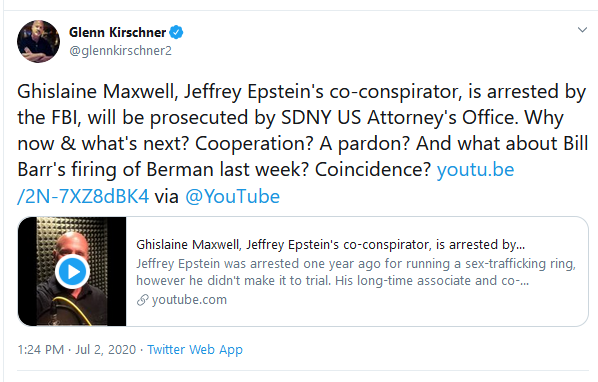

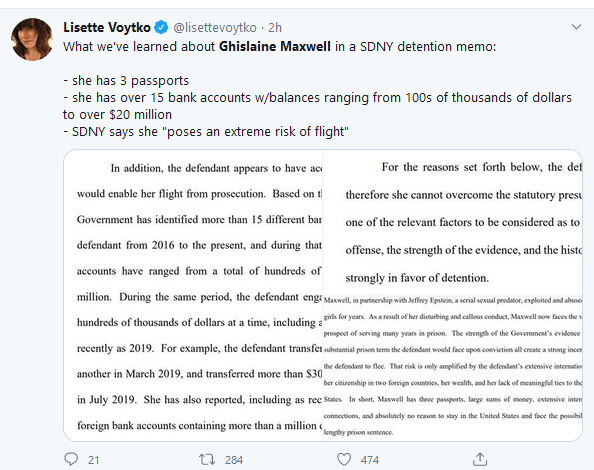
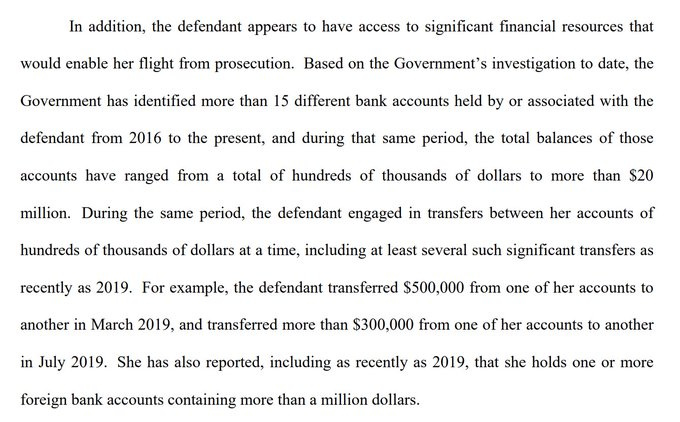

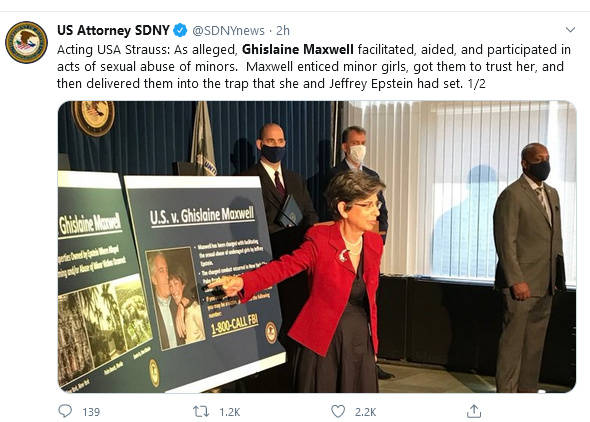
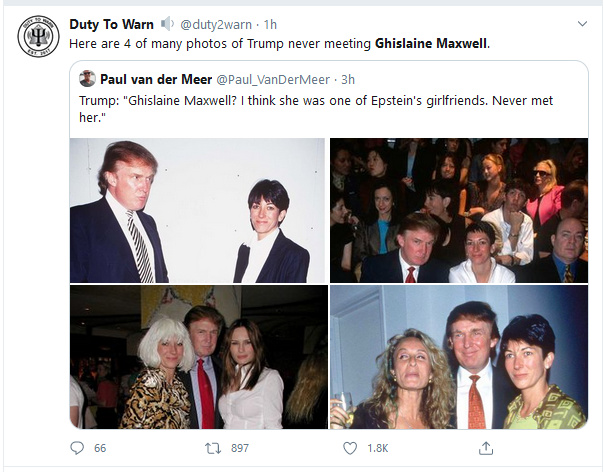
Ghislaine Maxwell, Jeffrey Epstein’s Confidante, Caught by the FBI in New Hampshire
The British socialite is expected to appear in federal court on Thursday on charges relating to the crimes of Jeffrey Epstein.
Also being bandied about is the fact that Alan Dershowitz recently went on a twitter tirade trying to distance himself from Epstein. Nobody understood why at the time…
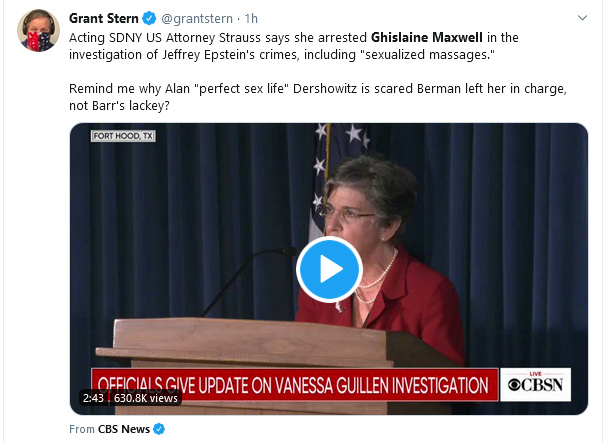

While a lot of this is speculation, the timing is pretty wild.
Yes…this was big news today. Thanks for posting a lot of the goings on with it.
I found this part interesting…Who might that be? Some are speculating Alex Acosta, and then the good old boys…T, Prince Andrew etc.
And talking about Ghislaine’s potential ‘immunity’ relating to what was agreed to in FL with Alex Azar presiding, with Epstein.
The Justice Department is considering replacing the US attorney in Brooklyn with a senior department official close to Attorney General William Barr, officials briefed on the matter said.
On Thursday, Richard Donoghue, the US attorney for the Eastern District of New York, told his staff he’d be stepping down to move to Washington as the Justice Department’s principal associate deputy attorney general, a powerful position that acts as a gatekeeper to investigations across the country, a spokesman for the office, John Marzulli, told CNN.
The most recent principal associate deputy attorney general, Seth DuCharme, is now being considered by department leadership for the top role in the Brooklyn office, where he had built his career as a prosecutor.
My wife says NPR was all over the Prince Andrew angle when she was listening at work.
Ok the SBA had to reveal who was receiving the PPP loans…and here are some results. Not surprising…but staggering of course.
https://twitter.com/JakeSherman/status/1280178419037339648?s=20’
Dozens of tenants of President Trump’s real estate company also received funds, reviving questions about conflicts of interest brought by the president’s continued ownership of his company while in office.
Large chains ― many of them backed by private equity ― have received millions of dollars that they appear to be keeping, which could rekindle questions about whether larger companies with Wall Street connections should accept the money or not.
Recipients of loans between $5 million and $10 million include several prominent restaurant owners: PF Changs, a chain of more than 200 U.S. restaurants acquired by Paulson & Co and Triartisan Capital Advisors last year; Legal Sea Foods, a chain whose investors include Graycliff Partners; and Silver Diner, the chain of diners listed as part of the portfolio of Goode Partners.
None of the companies immediately responded to requests for comment Monday afternoon. Dozens of publicly traded companies returned money after initially receiving millions of dollars from the program but then being told by Treasury that the program was not meant for large, well-capitalized companies and that they ought to return it.
…
Several members of Congress are benefiting from loans, including some who were directly involved in shaping regulations and some who benefited from a blanket waiver of ethics concerns for some federal officials seeking loans.
Among the loan recipients disclosed Monday is KTAK Corporation, a Tulsa, Okla.-based operator of fast food franchises owned by Rep. Kevin Hern (R-Okla.), according to public records. Hern has advocated to increase the size of loans available to franchises, including in a March letter to Senate leaders Mitch McConnell and Chuck Schumer.
KTAK reported receiving between $1 million and $2 million to support 220 jobs. A Hern spokesperson did not immediately return a request for comment.
Rep. Mike Kelly (R-Pa.) benefited when three of his car dealerships, located outside of Pittsburgh, received a combined total of between $450,000 and $1.05 million to retain 97 jobs, according to the data.
Kelly is not involved in the day-to-day operations of his auto dealerships, said spokesman Andrew Eisenberger, and did not participate in discussions between the dealerships and the PPP lender.
“Kelly’s small family business employs more than 200 western Pennsylvanians whose jobs were at risk because of [Pennsylvania Governor Tom Wolf’s] business shut down order,” Eisenberger said. “The Paycheck Protection Program was designed to sustain the income of workers who would otherwise have been without pay or employment at no fault of their own during the coronavirus pandemic, and organizations in which members of Congress have an ownership stake were not prohibited from receiving PPP loans to help their employees during this difficult time.”
The PPP disclosure includes the names of 660,000 small businesses and nonprofit organizations that received at least $150,000 in funding. Although that is less than 15 percent of the total number of loans, it is the most detailed disclosure yet on one of the largest economic stimulus packages created by the federal government, part of the $2 trillion Cares Act.
Trump’s intel briefer breaks her silence
“Be calm in your confidence, do your homework, and have that first briefing be where you hit the things they need from you,” she said. “Watch your audience and pivot—when they’re done, you’re done. Ultimately, it’s about listening to be heard. You have to really hear people and then adjust yourself.”
Sanner’s style isn’t unique—presidential briefers have traditionally tailored briefings to a particular leader’s preferences. But her advice to “pivot” away from issues the customer doesn’t want to discuss could explain why Trump wasn’t told, at least orally, about the Russia bounty intelligence—Trump’s singular resistance to hearing anything negative about Russia has led even his most senior Cabinet officials to tiptoe around issues related to the Kremlin and Vladimir Putin, former officials have said.
He’s defensive because he’s said shit like this  and his long time political advisor Roger Stone was the broker between Wikileaks and the GRU hackers known as “Fancy Bear”. It was all coordinated, clumsily but still coordinated.
and his long time political advisor Roger Stone was the broker between Wikileaks and the GRU hackers known as “Fancy Bear”. It was all coordinated, clumsily but still coordinated.
Read the mueller report redactions, it’s all there. See below
U.S. Killing Of Iran’s Gen. Soleimani ‘Was Unlawful,’ U.N. Expert Says
President Trump said the U.S. targeted Iran’s Qassem Soleimani because of an imminent threat. A U.N. investigator says the U.S. has produced no evidence to back that up.
Here’s a request for Congress to reject the President’s withdrawal from WHO during the time of a pandemic.
Letter to Congress on WHO Withdrawal from Public Health, Law and International Relations Leaders
750 scholars and experts in global public health, U.S. constitutional law, and international law and relations wrote to Congress in opposition to U.S. withdrawal from WHO.
June 30, 2020
The Honorable James Risch
Chair, Committee on Foreign Relations
United States SenateThe Honorable Bob Menendez
Ranking Member, Committee on Foreign Relations
United States SenateThe Honorable Eliot Engel
Chair, Committee on Foreign Affairs
United States House of RepresentativesThe Honorable Michael McCaul
Ranking Member, Committee on Foreign Affairs
United States House of RepresentativesDear Senators Risch and Menendez and Representatives Engel and McCaul:
The President has declared his intent to withdraw the U.S. from the World Health Organization (WHO). We are scholars and experts with long experience in global public health, U.S. constitutional law and international law and relations. As we outline below, the President lacks the legal authority to withdraw without congressional participation and approval. We therefore write to you with our deep concerns about the immediate hazards to health, safety, and security in the United States and globally from cutting ties with WHO. The WHO requires reforms, but as a founding member and the largest financial contributor, the U.S. is best poised to lead in these reforms if it remains in the WHO.
Withdrawing from or cutting funding to the WHO during a global pandemic would be a dangerous action for global health and U.S. national interests. Withdrawal cannot legally take effect for at least a year and requires the US to pay its outstanding contribution. Congress has the power to prevent this decision from going forward, and must not be silent and must note wait. We ask your committees, and other committees with jurisdiction over this matter, to hold hearings promptly to address the question of whether the attempt to unilaterally withdraw from the WHO is legal or in the national interest. We further look to your leadership on additional congressional action, including appropriating the full amount that the United States promised to WHO in FY2021 and passing a resolution expressly prohibiting withdrawal. Exiting from the WHO is antithetical to U.S. health and national security interests. COVID-19 has proven how the zoonotic leap of a single virus anywhere in the world can result in health and economic catastrophe in the U.S.
It is not overstatement to say that withdrawal will likely cost lives, American and foreign. Once outside the WHO, the U.S. would lose access to the WHO’s global system for sharing critical outbreak data and vaccines, slowing U.S. ability to return to normalcy from COVID-19, and to prepare and react to future pandemics. The rest of the world would be at heightened risk, too. The U.S. funds the largest portion of the WHO’s Health Emergencies Program, meaning that funding for testing and contact tracing, building health workforces, and vaccine development would be lost. Second or third waves of COVID-19 cases could repeatedly overwhelm health care systems and result in far more lives lost. When international travel resumes, many of these cases would find their way to the U.S., threatening Americans. Beyond COVID-19, the WHO will have less capacity to detect and control future outbreaks without U.S. support, marking a new era of pandemic risk. As COVID-19 has so vividly shown us, an uncoordinated response to health dangers beyond our borders will gravely affect the lives of those living in the U.S.
A number of other WHO programs would suffer enormously under U.S. withdrawal, especially as many global health resources are being redirected to fight COVID-19. Historically, the U.S. has served as a global health leader and the largest WHO donor (providing about 15% of its budget, or approximately $450 million annually). The U.S. has helped fund such initiatives as polio eradication, child nutrition, vaccines, HIV/AIDS, malaria, and tuberculosis. Pulling funding could reverse hard-won progress and erode the ability of the U.S. to shape and lead policy. For example, efforts to eradicate polio over the last two decades have reduced global cases by 99.9%, but loss of U.S. funding could potentially allow annual global polio cases to jump from a few hundred to 200,000 within a decade. This work has progressed with global leadership from Rotary Clubs in the U.S. and worldwide, partnering with WHO. Though the U.S. may attempt to remain a global health leader by rerouting funding directly to countries, or through global public-private partnerships, it will have far less ability to shape rules (such as the International Health Regulations), norms (such as the WHO Priority Bacterial Pathogen List), and programs. Even the President’s Emergency Plan for AIDS Relief, the U.S.’s signature achievement in responding to HIV/AIDS, has relied on WHO to deliver health messages, ensure quality medications, and set health workforce standards. As U.S. global health funding and leadership falters, the U.S. will lose capacity to engage in global health diplomacy, with China filling the leadership vacuum created by our departure.
Unilateral withdrawal from WHO also raises significant separation of powers concerns, for the President lacks the legal authority to do so without Congress. With the Constitution silent on the process of withdrawing from a treaty, the best understanding of the Constitution is a “mirror principle,” under which the same process the U.S. government uses to enter a treaty is required to withdraw from it. The United States joined WHO through a 1948 joint resolution of Congress. Therefore, a joint resolution would be required to withdraw.
Unilateral withdrawal from WHO raises separation of powers concerns for another reason as well. In Youngstown Sheet & Tube Co. v. Sawyer (1952), Justice Jackson famously wrote, “When the President takes measures incompatible with the expressed or implied will of Congress, his power is at its lowest ebb.” By unilaterally withdrawing from WHO, the President would be acting against the implied will of Congress.
In the joint resolution to join WHO, Congress set two conditions on withdrawing. First, withdrawal requires a year’s notice. Thus, any effort by the Trump Administration to withdraw could not take effect before July, 2021 at the earliest. Second, the United States must pay WHO dues in full for WHO’s current fiscal year. As Congress holds the power of the purse, this latter condition requires congressional action. Congress therefore clearly intended to retain a role in any decision to withdraw from WHO; it did not cede unilateral authority to the President. To ensure that the President may not claim that Congress’s FY2021 appropriations to WHO is acquiescing in or approving the President’s attempted withdrawal, we recommend that Congress expressly state both its opposition to withdrawal and its unambiguous support for continued U.S. membership.
A decision to withdraw the U.S. from or cut U.S. funding to WHO would threaten the health security of Americans as well as all other nations and could dismantle decades of global health progress. The public’s health as well as respect for our separation of powers requires congressional leadership on this question. We call on Congress to hold hearings on a matter vital to U.S. and global health security.
Sincerely,
*Affiliations listed for identification purposes only and do not reflect institutional endorsement
Lawrence O. Gostin
Linda D. & Timothy J. O’Neill Professor of Global Health Law, Georgetown Law
and other signatories…see link
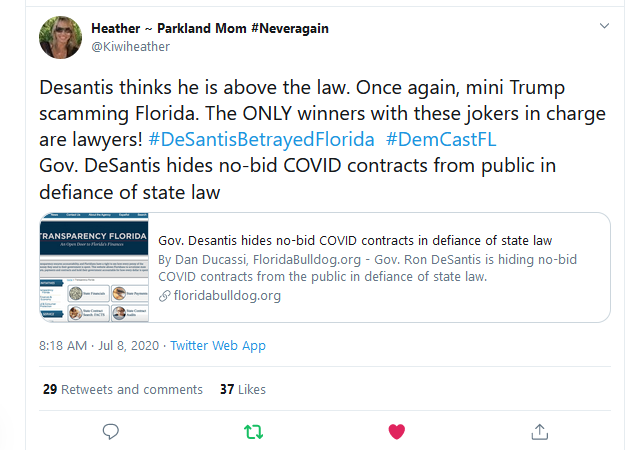
Harvard and M.I.T. sue over the Trump administration’s plan to require in-person classes for foreign students.
Harvard University and the Massachusetts Institute of Technology sued the Trump administration in federal court on Wednesday, seeking to block a directive that would strip foreign college students of their visas if their coursework was entirely online.
The universities argued that the policy, announced on Monday, was politically motivated and would throw higher education into chaos. It was widely seen as an effort by the White House to pressure universities into reopening and abandoning the cautious approaches that many have announced they would adopt to reduce Covid-19 transmission.
Lt. Col. Vindman will retire after being bullied, and demoted essentially by T 'n Co. He was subjected to retaliatory threats and treated very poorly. Vindman stood up for principals and called out T’s behavior as reprehensible so he goes down as a hero in my book, despite the consequences for his brave actions. 
Lt. Col. Alexander Vindman, a key witness in President Donald Trump’s impeachment inquiry, is retiring from the US Army after more than 21 years of military service because he determined that his future in the armed forces “will forever be limited” due to political retaliation by the President and his allies, his lawyer told CNN Wednesday.
Vindman has endured a “campaign of bullying, intimidation, and retaliation” spearheaded by the President following his testimony in the impeachment inquiry last year, according to his attorney, Amb. David Pressman.
News of Vindman’s retirement marks the culmination of a months-long saga dating back to his public testimony in November.
Trump fired Vindman as the top Ukraine expert on the National Security Council in February and also ousted his twin brother who also played a key role in impeachment proceedings while serving at the White House as an NSC lawyer.
